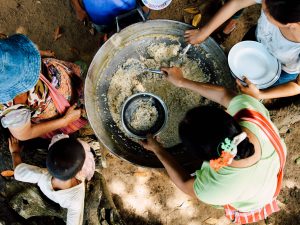
Daring to Eat Authentic: Without Getting Sick
From Latin, to Thai, to good ‘ol Canadian poutine, wherever you are in the world you are bound to indulge in some delicious local cuisine. That is one of the greatest joys of traveling abroad, we think. Years from now, when you look back on this volunteer trip, you’ll be able to remember some of the delectable meals that you tasted and enjoyed with a new community of people.
But travelers be warned. International eating can have negative effects on your body, especially as you are getting acclimated to the new culture. Every country has a different standard for health, sanitation, and the handling of food. To make sure that you protect your immune system from unwelcome bacteria and microbes, be sure to follow these tips.
Prior to departing:
1. Learn About Your Destination’s Eating Styles
Is your host country primarily vegetarian? Are traditional meals heavy on the spices, fiber, or animal products? These are things that you may want to know before departure, so you can be prepared with the necessary over-the-counter medicines.
2. Keep Your Health and Immune System Up
As you prepare for your upcoming volunteer trip keep your overall health and immune system in tip-top shape. Get regular exercise, good rest and consider taking probiotics to encourage good gut health. If you are pregnant, elderly, or battle a poor immune system you may want to visit your doctor for healthy travel recommendations prior to departing on your trip.
3. Update Your Volunteer Card Policy
No matter how much care you take, eating abroad can still cause some illness for the common traveler. If you do find yourself with an unexpected food-related illness you’ll be glad that you had your Volunteer Card to help you. Before you depart on your next volunteer trip, make sure you have your policy up-to-date. Choose from the Basic, Plus, or Premium plans, all which include coverage for illness medical expenses.
Once You’ve Arrived:
1. Drink Only Bottled Water
In general, avoid consuming tap water at all cost as it is typically high in bacteria and microbes that can cause illnesses. It is highly recommended that you only drink bottled water. To avoid and mishaps, if you are given a bottle of water make sure that you know it is new and just opened.
2. Peel Your Own Fruits and Veggies
Fruits and vegetables without peels are likely culprits for airborne contaminants. The traveler’s mantra for fruit and veggies is “Cook it, wash it, peel it, or forget it.”
3. Avoid Certain Animal Products
Cold meat, unpasteurized dairy such as cheese, milk, and yogurt, and fish should not be consumed. These things are often home to rampant bacteria. Seafood dishes are especially notorious for causing intestinal problems because of their likelihood to accumulate contaminants from water. Fish organs and shellfish (clams, mussels, and oysters) should be especially high on your watchlist.
4. Trust Your Gut
If you’re ever unsure about the food being offered to you, you’re better off just politely declining. Trust your instincts because chances are you’ll be protecting yourself from some very uncomfortable food related illnesses.
What are some of your favorite adventurous dishes you’ve tried during a volunteer trip? We want to know on Facebook and Twitter!
Photo Credit: Zozi.com
Edits: Volunteer Card










